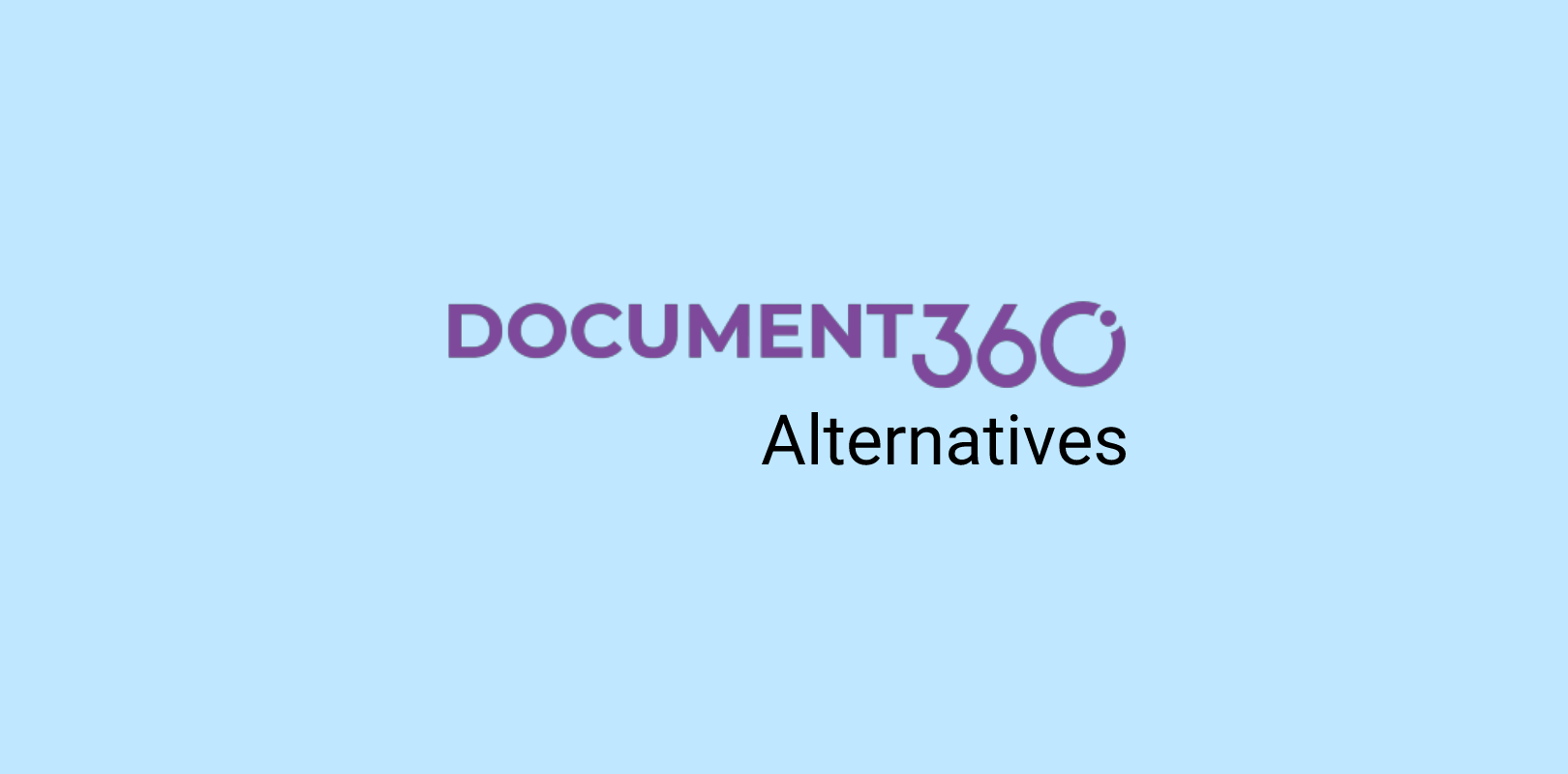
When it comes to online documentation management, finding the perfect tool to streamline content creation and knowledge sharing can be a deal-breaker.
Document360 may be a popular tool, but it’s not the first choice for many businesses. Expensive subscription plans and a lack of template options are some serious drawbacks that make users look for better-performing Document360 alternatives.
In this blog, I’ll introduce you to some of the alternatives to Document360 that I have worked with over the years. I will also shed light on what they’re good at and where they might fall short.
This way, you can make a smart decision about which tool is best for your needs when it comes to managing and sharing information.
List of the 10 Best Document360 Alternatives
There is tough competition among Document360 competitors, with each tool painting a promising picture.
That’s why, I have curated the list of 10 best Document360 alternatives through my experience, peer reviews, and insights from reliable websites to help you make a well-informed decision.
1. ProProfs Knowledge Base – Best for Content Authoring
The first alternative I would suggest is ProProfs Knowledge Base, which has been a game changer for me. One of its features that I want to highlight is the Help Authoring tool.
It is incredibly user-friendly, providing an MS Word-like editor. With this tool, I can easily craft and edit content, upload files, and create a polished knowledge base within minutes.
Also, adding videos and images to my knowledge base pages is super easy.
What truly sets this tool apart is its flexibility. I have the ability to customize the table of contents, manage multiple authors efficiently, and even create a multilingual knowledge base to cater to a global audience.
The revision history feature allows me to keep track of changes, restore previous versions, and compare different page versions.
What You Will Like:
- Control user access with roles and permissions
- Monitor knowledge base performance with built-in reports
- Customize the content with your preferred colors, fonts, and themes
- Ready to use knowledge base and user guide templates
What You May Not Like:
- The 15-day free trial seems inadequate, given the vast range of features offered
- While templates are available, it would be great to see more versatility in the available designs
Pricing:
Starts from $49/author/month
2. Zendesk – Best for Managing Customer Support
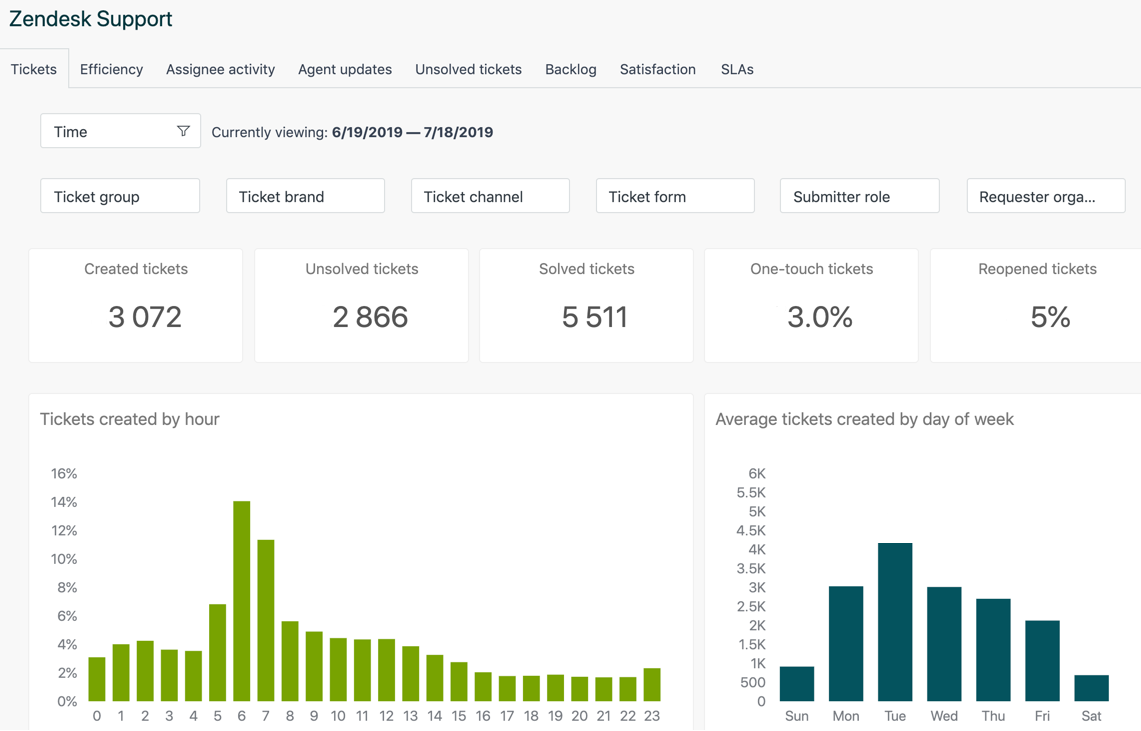
Zendesk is my top choice when it comes to managing support, and it’s a compelling alternative to Document360.
With Zendesk, I have found an all-in-one solution that excels in streamlining customer support operations. Its user-friendly interface simplifies ticket management, allowing me to prioritize and resolve customer inquiries efficiently.
Zendesk also offers robust reporting and analytics tools, helping me gain valuable insights into support performance and customer satisfaction.
What sets this tool apart is its scalability – it adapts seamlessly to the growing needs of my business, making it suitable for both small startups and large enterprises.
The extensive integrations and automation capabilities further enhance my support workflows. In my experience, Zendesk truly stands out as the go-to choice for managing support effectively and ensuring customer happiness.
What You Will Like:
- Use customizable themes and safety manual templates to build a brand-aligned help center
- Identify what content works best and what needs improvement
- Provide instant and contextual self-service inside your product or website
- Create and update reusable content across all articles
What You May Not Like:
- It has complicated pricing plans, and the best support features are only available at higher pricing tiers
- It has a potentially low-quality Answer Bot that is not the best in the market
Pricing:
Starts from $55/agent/month.
3. Confluence – Best for AI-Powered Knowledge Base
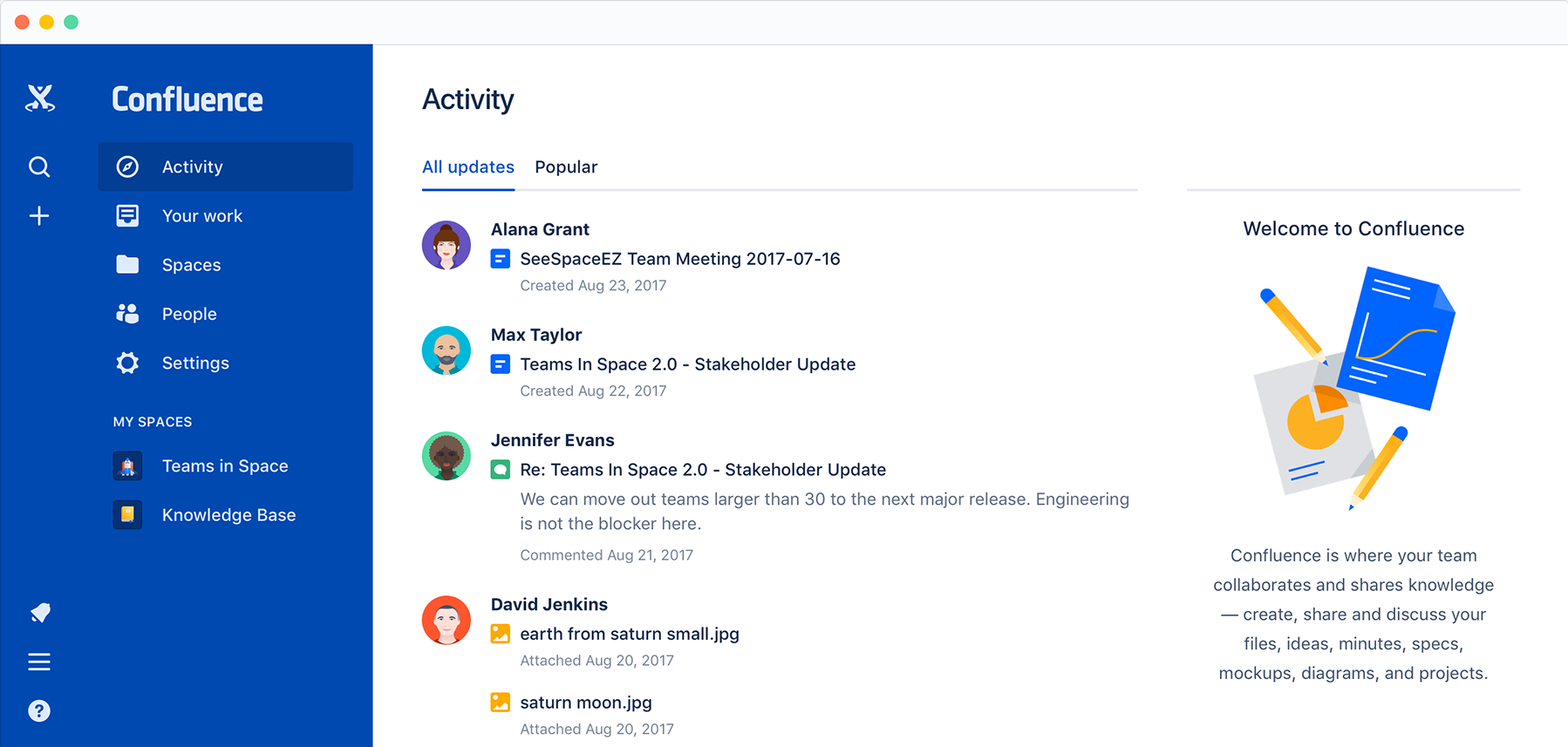
With Confluence, I had the flexibility to create dynamic documents that included text, images, code, and tables and even embed content from other tools seamlessly.
What I particularly appreciate is the Atlassian Intelligence feature, which is powered by AI. It made it easy for me to find answers, reduce confusion, and simplify information sharing with its auto-suggestions, info tips, and smart links.
The real-time collaboration features kept me in the loop with updates, notifications, and task assignments using @ mentions. Plus, page revision history prevented any version control issues.
Apart from the above, Confluence’s extensive library of templates caters to every team and project, and its integration with other Atlassian products and third-party apps ensures a smooth and personalized workflow.
What You Will Like:
- Robust collaboration tools such as comments, mentions, likes, tasks, and notifications
- The user-friendly interface simplifies tasks like creating, editing, and organizing pages
- Provides a wide variety of templates and macros, including calendars, polls, roadmaps, diagrams, and charts, enhancing page functionality
- Manage who can access and edit pages and spaces, and implement page restrictions and approval workflows for content quality and security
What You May Not Like:
- Has limited scalability due to its lack of unlimited storage
- The platform lacks essential document management features like versioning, locking, or check-in/check-out for attachments
Pricing:
Free plan for up to 10 users. Paid options start from $5.75/user/month.
4. GetGuru – Best for AI-Powered Answers
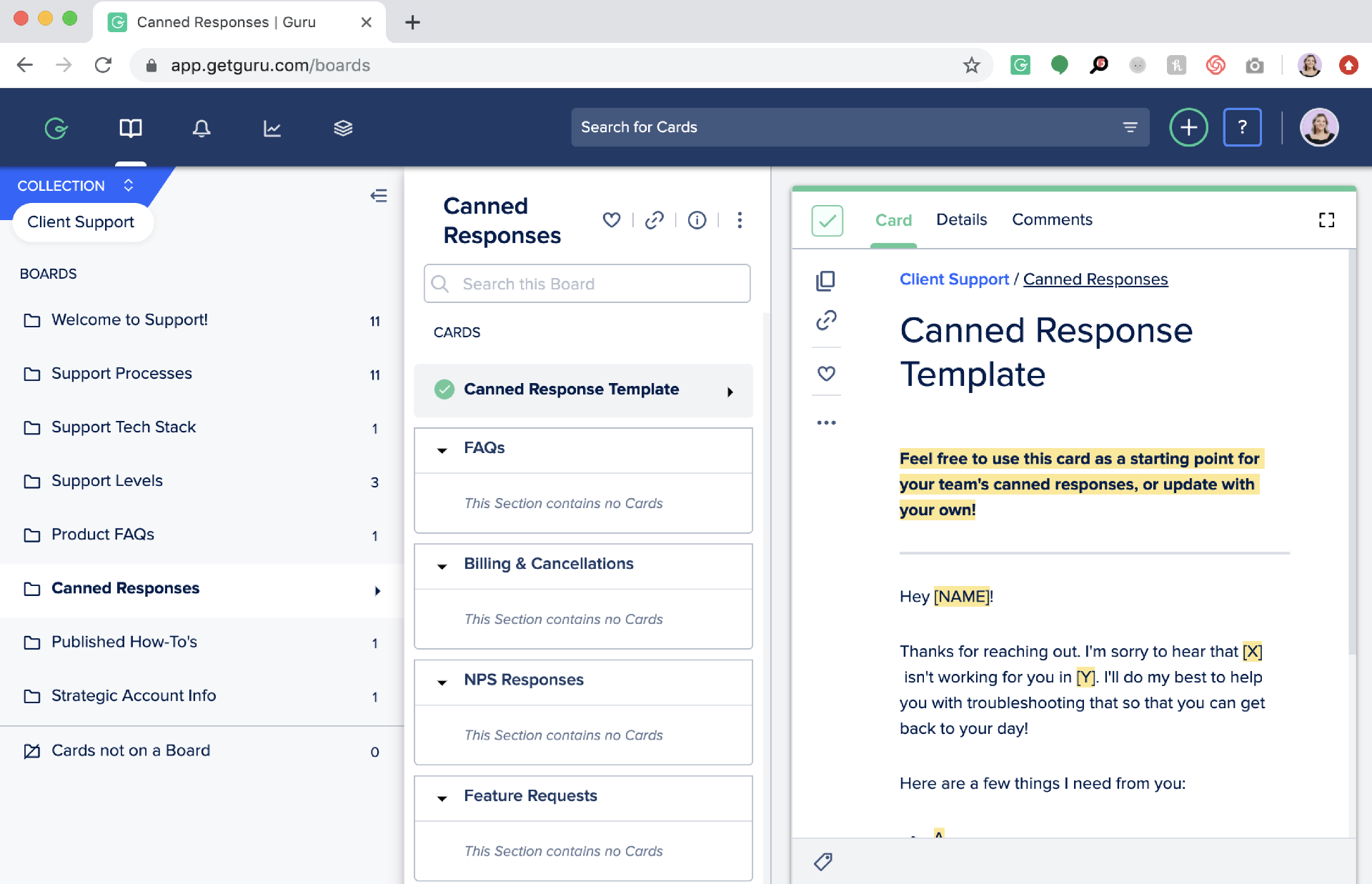
What truly sets Guru apart is its AI-powered Answers feature, which combines the immediacy of search with human-verified knowledge.
During my experience with the tool, its ML-powered search function refined the results based on user interactions, ensuring users always found the information they needed. It was like having an expert at your fingertips 24/7.
When it comes to creating and maintaining knowledge, Assist’s generative AI feature works wonders, enhancing the quality and conciseness of your content.
Guru’s AI tools, like Suggest Expert and Trending Topics, empower you to cut through noise and focus on essential knowledge. Keeping knowledge up-to-date is effortless with their AI suggestions and Duplicate Detection.
What You Will Like:
- Build custom knowledge triggers to keep your team updated
- Provide relevant article suggestions right inside the chat tools
- Identify duplicate content and keep your knowledge base clean
- Organize content using ‘Collections,’ ‘Boards,’ and ‘Cards’
What You May Not Like:
- The search function is not very efficient and sometimes requires exact keywords to find the relevant information
- Does not offer CSS customization, which limits your ability to change the layout and format of your knowledge base
Pricing:
Starts from $5/user/month.
5. Bloomfire – Best for Q&A Features
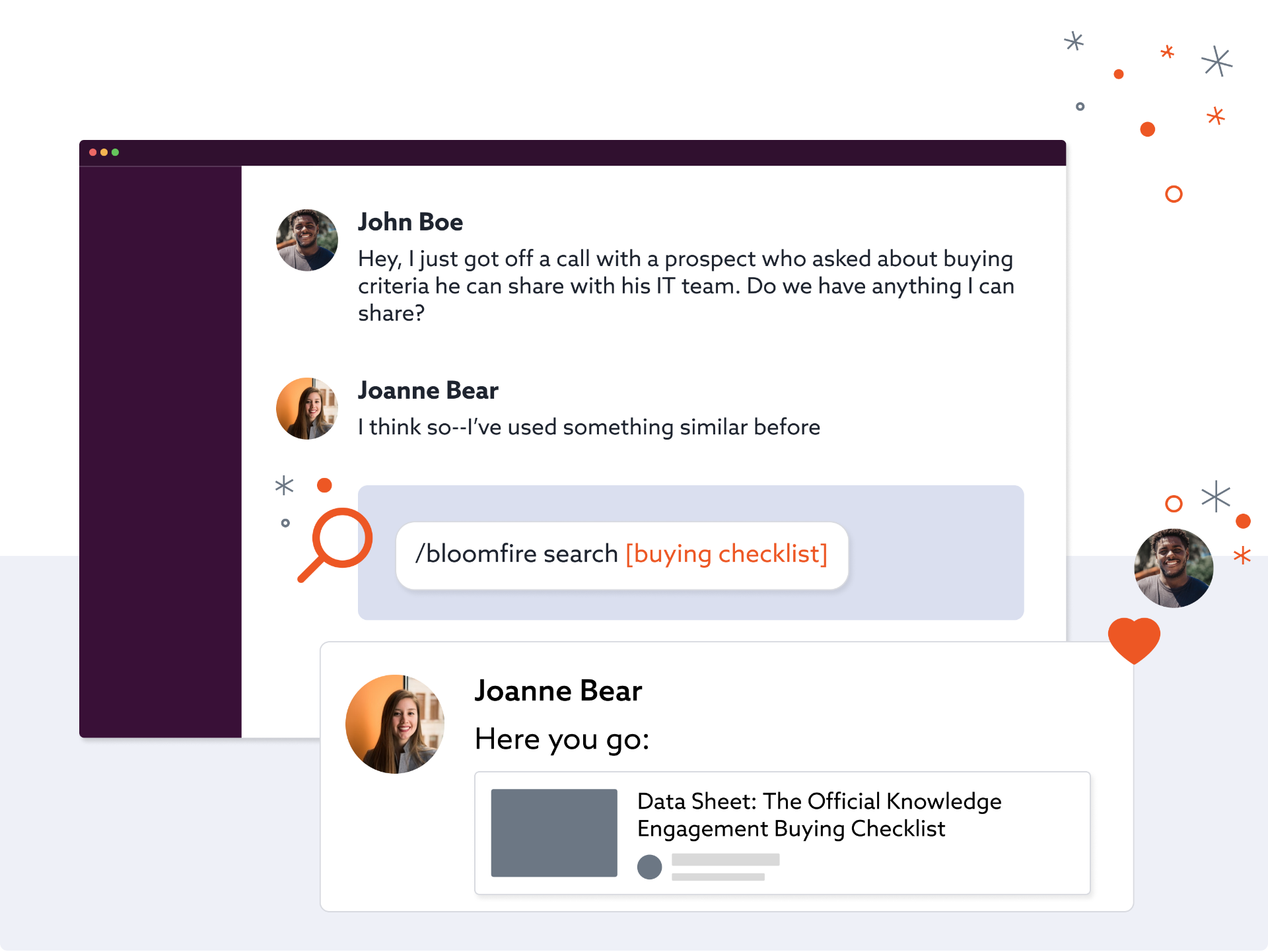
Bloomfire is an excellent alternative to Document360 as it eradicates those pesky knowledge silos that often plague organizations. It enables every team member to access vital information effortlessly, whether in the office, in the field, or working remotely.
I was greatly impressed with its Q&A features, designed to help turn questions and answers into searchable content that can benefit anyone in the organization.
Bloomfire helps democratize information across the organization. This promotes self-sufficiency, reduces time spent searching for data, prevents knowledge loss when team members transition, and keeps everyone aligned.
The platform offers a personalized feed, ensuring that you’re always up-to-date with relevant content, and it boosts content confidence by identifying duplicates and scheduling reviews.
What You Will Like:
- Monitor user engagement and spot knowledge gaps with built-in analytics
- Tailor your knowledge platform using white labeling and custom branding
- Deliver relevant content results with AI-powered search
- Keep your content secure with strong backup and data encryption
What You May Not Like:
- It may take a long time to learn how to use the platform effectively and find the information you need
- There is an additional setup fee, which makes it more expensive
Pricing:
Starts at $25/user/month.
6. Notion – Best for a Connected Workspace

I found Notion to be an indispensable tool for centralizing my organization’s knowledge resources. With Notion, I could create, organize, and share my information exactly how I wanted it.
It was like having a digital workspace where I could tailor everything to suit my unique needs, whether I was creating wikis, documenting projects, or keeping track of tasks.
I could connect various pieces of information, forming a network that helped me see how everything was related. This feature alone made a world of difference in how I approached my work.
I harnessed the power of Notion AI to make my knowledge management even more efficient. It helped me summarize lengthy texts, generate questions and answers, and discover related content, ultimately saving me valuable time and offering deeper insights.
What You Will Like:
- Kickstart the documentation process quickly with ready-made templates
- Organize your workspace with simple drag-and-drop
- Set advanced permissions to control content access
- Manage tasks and projects using Gantt Charts and Kanban Boards
- Network documentation
What You May Not Like:
- It has too many options and tools that can be confusing and overwhelming for some users
- It uses icons and images excessively, which can make it look cluttered and unprofessional
Pricing:
Free plan available (limited to 10 guests only). Paid options start from $8/user/month (billed annually).
7. Archbee – Best for Creating Interactive Documents
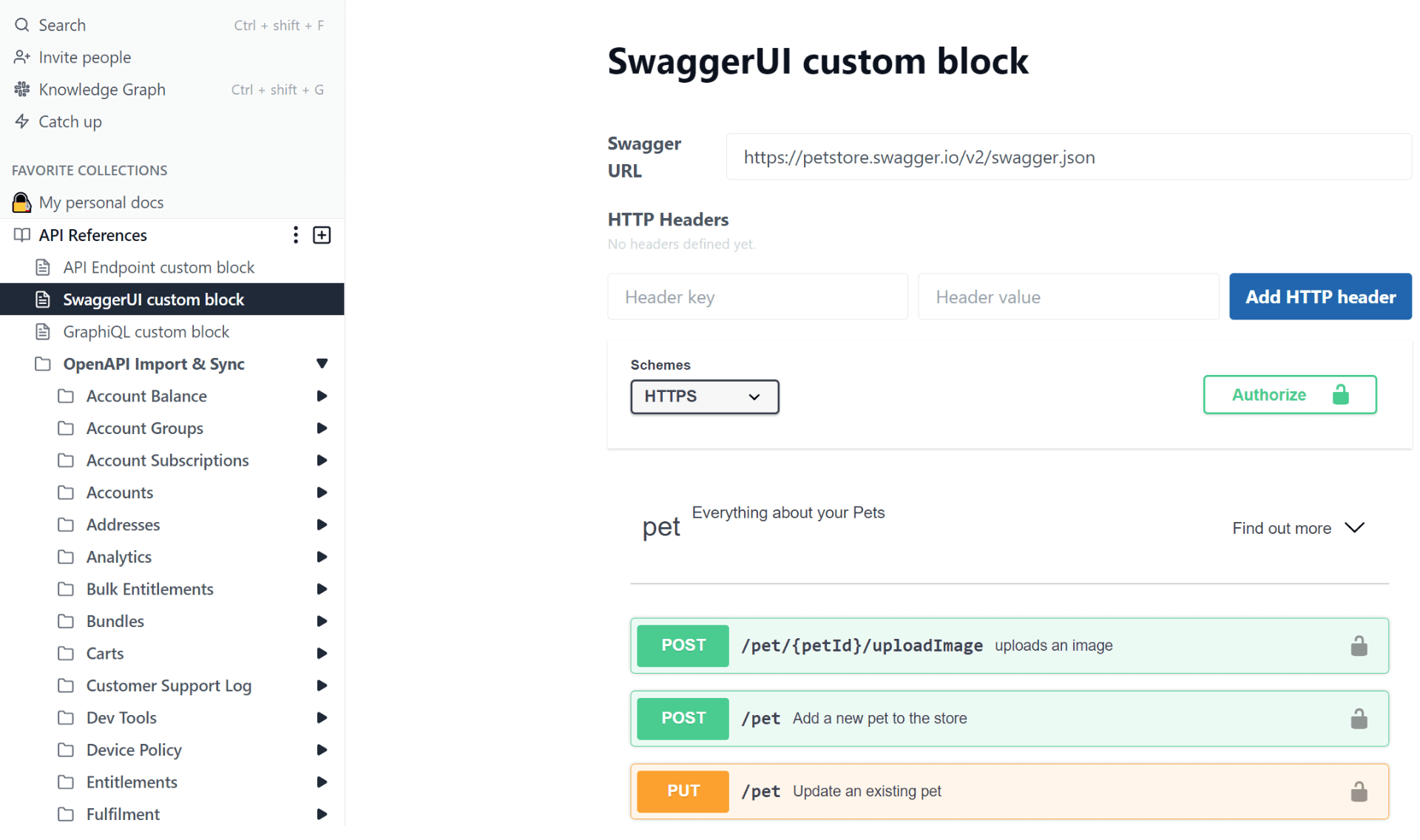
My experience with Archbee’s documentation portal has been truly remarkable. This tool, powered by cutting-edge generative AI, has revolutionized the way I handle documentation.
It’s like having an instant knowledge resource that accurately responds to user queries.
What I particularly like about this tool is its rich array of custom blocks.
These allow me to create interactive and organized content effortlessly, ranging from images and videos to API references and diagrams.
Collaborating with my team has become a breeze, thanks to features like multiplayer and team reviews. Moreover, Archbee seamlessly integrates with our existing tools, ensuring a smooth workflow.
What You Will Like:
- Drag and drop folders to keep your documentation portal organized
- Author content effortlessly with Markdown editor
- Password-protect documents for enhanced security
- Deliver accurate results with the tool’s blazing-fast search
What You May Not Like:
- The editor is buggy and sometimes the cursor moves to a new location, causing incorrect text input
- The search function is not very user-friendly and it auto-selects a result without confirmation
Pricing:
Free plan available (Limited to 3 members). Paid options start from $40/month.
8. Nuclino – Best for Team Collaboration
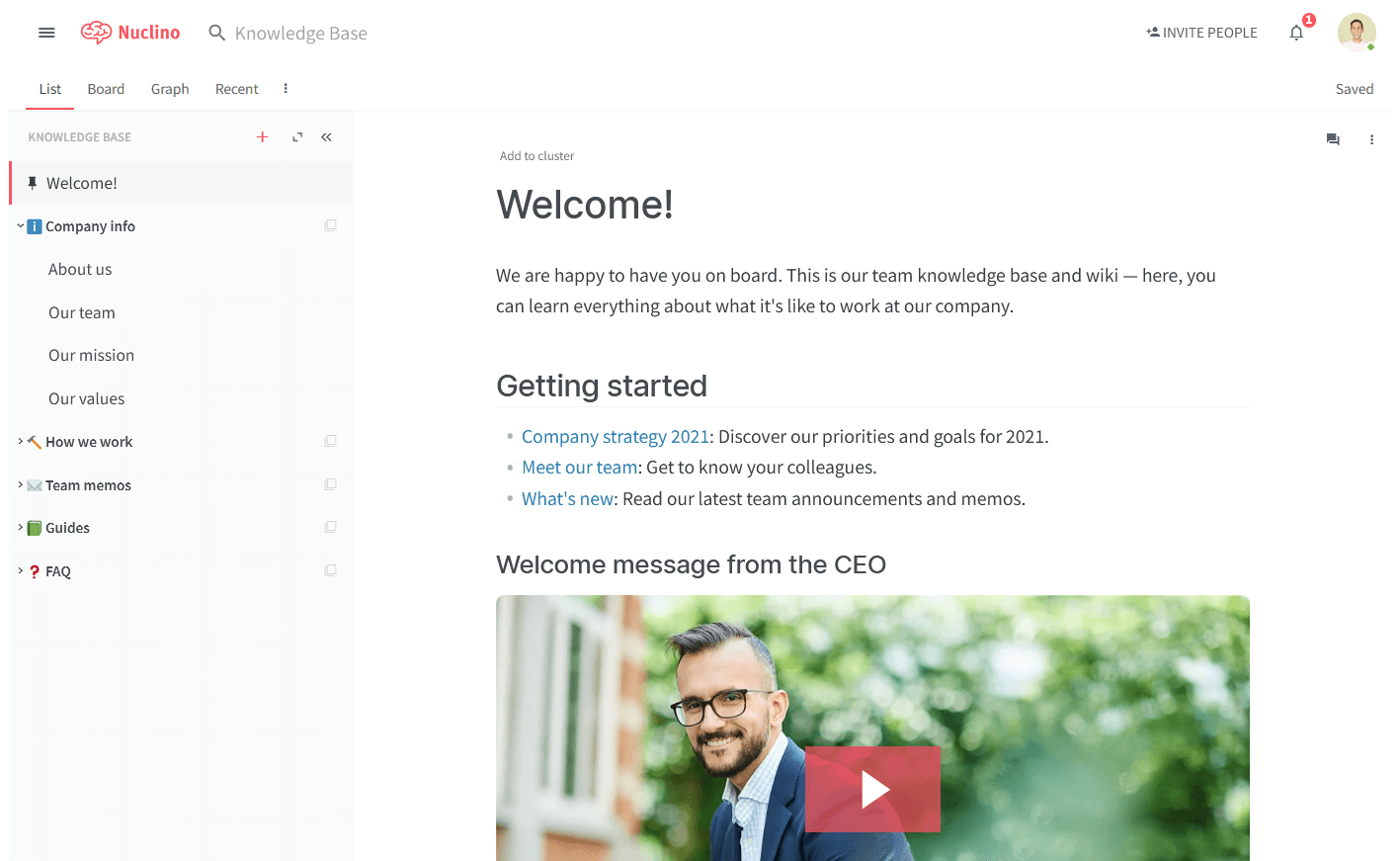
Another Document360 alternative I would like to introduce to you is Nuclino, a user-friendly team knowledge base software.
It’s the perfect solution for teams seeking a smooth collaboration experience without the hassles of information silos or frequent context-switching.
Nuclino offers diverse options for organizing and visualizing your content.
You can use nested lists, a Kanban board, tables, or a mindmap-style graph, making it versatile for various team needs. It also integrates with popular tools such as Slack, Google Drive, GitHub, and more, enhancing your workflow.
With Nuclino, you can effortlessly create a user-friendly, easily searchable knowledge base that encourages collaboration. Whether you’re documenting processes, brainstorming ideas, managing projects, or sharing feedback, Nuclino empowers you to do it efficiently.
What You Will Like:
- Allow teams to co-edit articles and track changes in real-time
- Manage tasks and projects using the Board view
- Organize information in workspaces and collections
- Auto-save changes and syncs them across devices
What You May Not Like:
- Users cannot change the font size, color, or style of the text
- It becomes slow or unstable when there are too many documents or collaborators
Pricing:
Free plan available (limited to 2 GB storage only). Paid options start from $5/user/month.
9. KnowledgeOwl – Best for Contextual Help Widgets

With KnowledgeOwl, you can create and manage articles effortlessly.
You’ll find a rich WYSIWYG editor that makes content creation a breeze. It supports various publishing statuses, including draft, published, and archived, giving you control over what’s visible.
I particularly like the Contextual Help Widget, which makes it a breeze for our users to find the information they need without disrupting their workflow.
The hierarchical display of our knowledge base and the full search functionality have made it easy for me to locate answers quickly.
What’s more, I have the flexibility to recommend specific articles to guide users effectively. The built-in contact form is a helpful feature, ensuring users can reach out for additional assistance when required.
What You Will Like:
- Set article status to control visibility and workflow
- Reorganize categories with simple drag-and-drop
- Capture feedback on articles using a thumbs-up/down or 5-star rating system
- Get notified when readers add comments to articles
What You May Not Like:
- The platform does not have a conflict warning when two editors are editing simultaneously
- The edit and readers screen do not mirror each other
Pricing:
Starts at $79/month.
10. HelpDocs – Best for Providing Personalized Support
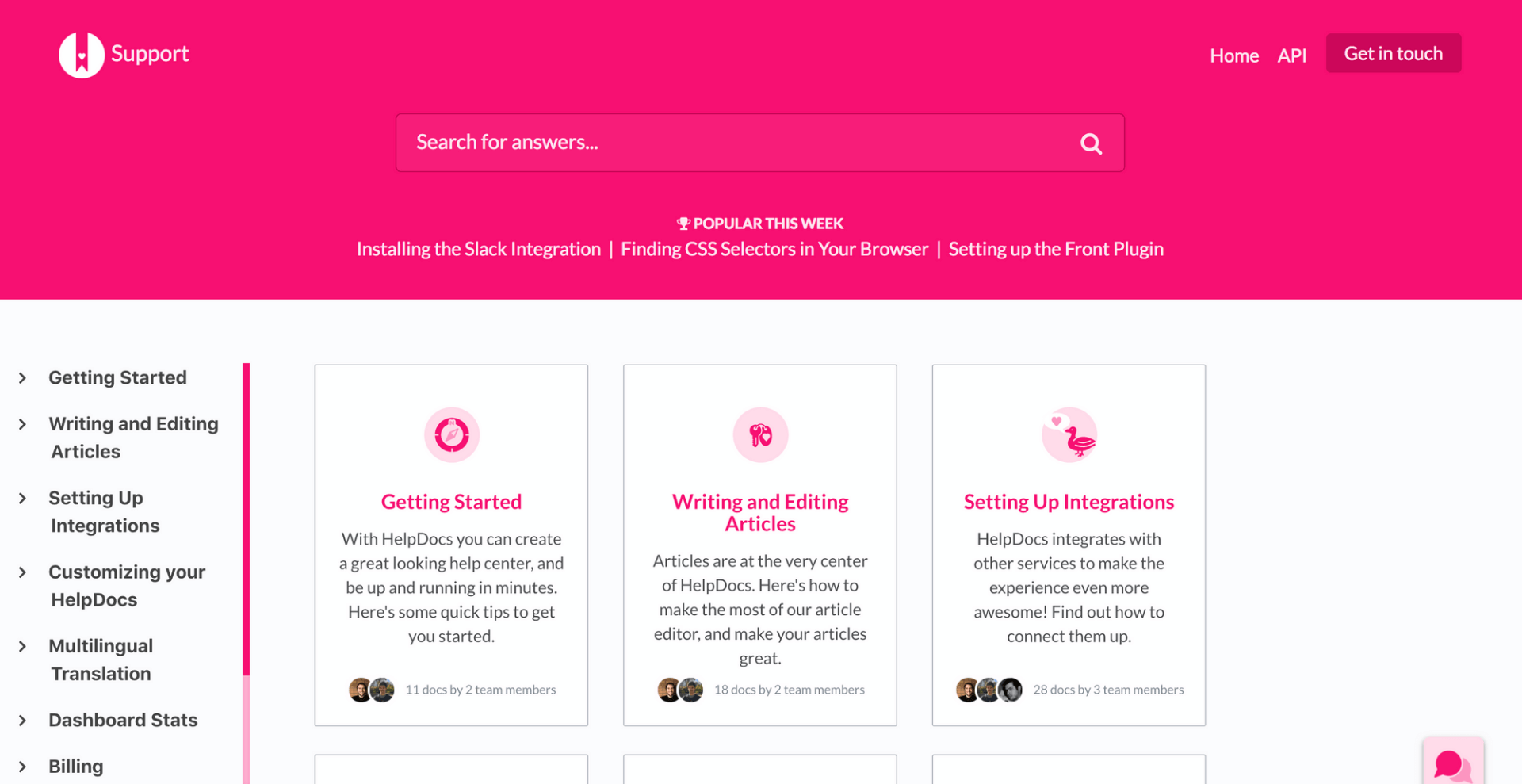
I’ve used HelpDocs to enhance customer support through a personalized approach. With it, I could tailor content based on user attributes like language, location, or device.
The lighthouse widget embedded in our app offered contextual help.
Feedback collection and analytics helped gauge knowledge base performance. Integrations with chatbots, email, video, and social media further enriched the support experience.
HelpDocs allowed me to craft a branded self-serve journey, learn from customer interactions, and continuously refine our knowledge base.
It’s a user-friendly, potent tool that significantly improves customer satisfaction and retention.
What You Will Like:
- SEO-focused templates to start building content quickly
- Easy monitoring of article performance and knowledge base traffic
- Add, manage, and scale users to increase collaboration
- Smart, typo-tolerant search to find information quickly
What You May Not Like:
- It does not support exporting documents to an editable format, such as Word or Google Docs
- It does not have a native mobile app, so you have to access your knowledge base through a web browser on your phone or tablet
Pricing:
Starts from $69/month.
Which Document360 Alternative Should You Choose?
Selecting the right Document360 alternative depends on several factors: content authoring, support management, scalability, collaboration, intelligence, and automation.
Based on these factors, my top 3 recommendations would be-
Option A: ProProfs Knowledge Base
It excels in content authoring with its user-friendly tool, enabling easy content creation and multimedia integration. Customization, multilingual support, and revision history enhance flexibility.
Option B: Zendesk
It’s an excellent choice for support management, offering intuitive ticket management, insightful reporting, scalability, and extensive integrations for businesses of all sizes.
Option C: Confluence
This is ideal for intelligent knowledge management, providing dynamic document creation, AI-driven features like auto-suggestions, real-time collaboration, and extensive integration options.
In my opinion, the ProProfs Knowledge Base is the best. Its user-friendly content authoring tool, seamless multimedia integration, customization options, multilingual support, and robust revision history features collectively make it the ideal solution for efficient and versatile knowledge base management.
Ultimately, your choice should align with your specific needs, whether focused on content creation, support management, or intelligent knowledge management.
FREE. All Features. FOREVER!
Try our Forever FREE account with all premium features!







